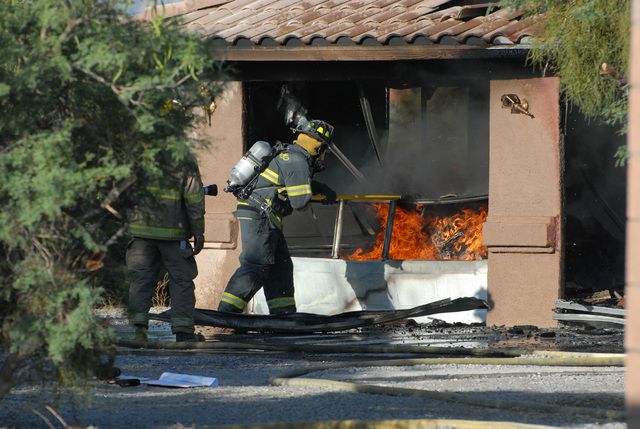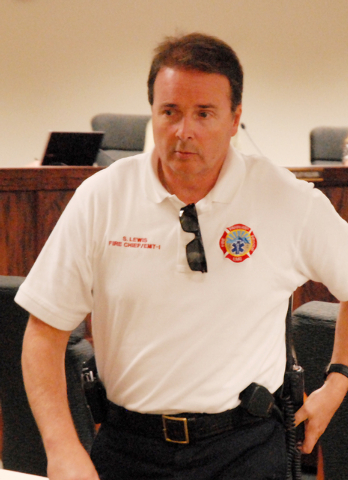Lewis, union calm concerns over departures
Pahrump Valley Fire and Rescue Services Chief Scott Lewis wants to ensure the community that public safety is the department’s first priority.
Lewis’ comments came days after the Pahrump Town Board learned that more than a half-dozen firefighters have sought employment in Las Vegas following a conversation between a county official and several members of the fire department on the issue of privatizing the town’s ambulance service to save money.
On Monday, Lewis said transitioning to a for-profit ambulance service, by definition, will not achieve the desired results, contrary to what those who support the idea say.
He used the town’s common accounting practices to drive home his point.
“It will not save money because it’s ‘fee for service.’ There’s only a certain portion of our firefighters service that’s funded through general fund taxes. The rest is funded through the enterprise fund, which is only fee for service. There’s no general fund monies going into that account,” he said.
Critics of for-profit ambulance services maintain that municipalities who look at privatization as a money saving mechanism, are short-sighted because profits take priority over actual emergency medical care.
Additionally, Lewis said for-profit companies do not provide the same level of expertise for a patient who requires more than transportation to a medical facility.
“If you have a privatized ambulance service operating in town when there’s a fire call or something else, you no longer have those cross-trained individuals working seamlessly together. They have an EMS component only, that cannot assist with a fire. They are not Fire I trained to engage in those type of activities. If we don’t have them in our organization, we lose that capability and capacity,” Lewis said.
Lewis warned that the department may have to find alternatives to maintain the same level of public safety within the community if ambulance service is privatized.
He noted that all local residents could indirectly be affected if privatization was implemented.
“You could potentially no longer have the numbers of firefighter/EMT and you’ll start experiencing station closures, unless you incur more monies from the general fund. In other words, our citizens will be adversely affected because they will have to pay more taxes to support the crew numbers needed that you currently have, which is at a minimum right now. In my opinion, we are still operating at substandard levels for a town our size,” Lewis said.
Still, the chief said along with the department’s modest turnover rate, and news of possible future departures, his department remains prepared.
“When we lose people who go on to different jobs, or move and there’s a possibility of a larger number going at one time, we do have contingencies that we’ve been working on. We are as prepared as we can be without knowing what the actual numbers are. With the numbers, it’s not just the issue of quantity, it’s also the quality. Are they drivers or hazmat trained? What level of EMS certification are they? We have to take all of those things into consideration in creating our secondary plan,” he said.
PVFRS Union President Justin Snow said this week that while he understands the concerns of the town board regarding the matter, he’s confident the issue is not as grave as some may believe.
“Based on my experience and speaking with counterparts, there’s a very small chance that we’ll lose that many firefighters. Even if we do, as Chief Lewis said, we do have a plan in place to mitigate that. We have a plan for the worst case scenario, however, we do not expect the worst case scenario,” he said.
Lewis, meanwhile, said all of the department’s firefighters are reporting to duty as they always have.
“We are operating as normal and they are responding to their jobs on their scheduled shifts. Whether or not they are actually offered these positions, which they may or may not pursue, whatever hand the town is dealt in our organization specifically, we have some plans in place that we will initiate immediately so we don’t have any tremendous service interruptions depending on if that happens,” Lewis said.
Moreover, the fire chief said he does understand why some crew members may want to explore advancing their respective careers.
“The county transition aside, it looks attractive to be member of a large city department and that alone can attract some of our folks as it has in the past,” he said.
County Commissioner Butch Borasky said this week that as far as he knows, there is nothing “on the table” relating to the privatization of the town’s ambulance service.
“I don’t want to comment on something that may or may not ever happen. There seems to be this push that the county is going to make this happen right away, but I have no knowledge of that happening. There’s one or two people who have mentioned it. That’s something that’s in the distant future, if it even happens,” he said.
On average, fire and EMS crews respond to roughly 600 service calls each month from transports, to motor vehicle accidents and structure fires. However, county officials recently questioned the manner in which PVFRS computes its number of service calls.
Multiple officials told the Pahrump Valley Times that they believe the number of service calls as calculated by the fire department are based not on the number of actual calls for help from the public but instead on the number of units responding to any one call for service. This means if three ambulances show up to one emergency, it’s counted by the PVFRS as three calls for service, they said.

















